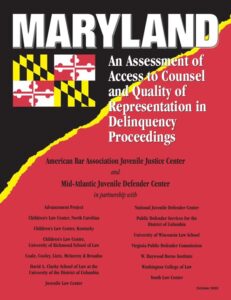Maryland: An Assessment of Access to Counsel and Quality of Representation in Delinquency Proceedings (2003)
This assessment of access to counsel and quality of representation received by children in the State of Maryland is part of a nationwide effort to address deficiencies and identify strengths in juvenile indigent defense practices. More than thirty-five years after the United States Supreme Court decided that children have a constitutional right to counsel, the spirit and promise of the Gault decision has been largely unfulfilled. With few exceptions, juvenile indigent defense practices have gone unchecked. The purpose of this assessment is to take a closer look at juvenile defense practices in Maryland, identify the systemic and institutional obstacles that impede the development of an improved legal service delivery system, highlight innovative practices and offer recommendations for change.
Using various modes of data collection, a team of national and state-based experts conducted extensive interviews with judges, prosecutors, defense attorneys, intake officers, probation officers, court clerks, detention center staff, police officers, children and families, and policymakers across the state. In addition, the teams observed juvenile court proceedings in selected counties, visited every juvenile detention center in Maryland and conducted extensive legal and literature reviews.

